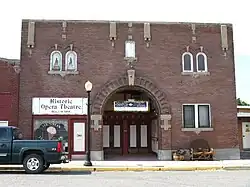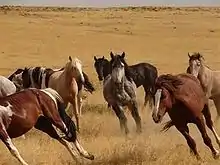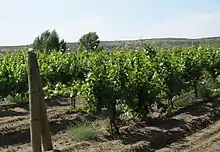Glenns Ferry, Idaho | |
|---|---|
 Location of Glenns Ferry in Elmore County, Idaho. | |
| Coordinates: 42°57′7″N 115°18′4″W / 42.95194°N 115.30111°W | |
| Country | United States |
| State | Idaho |
| County | Elmore |
| Area | |
| • Total | 1.98 sq mi (5.14 km2) |
| • Land | 1.96 sq mi (5.07 km2) |
| • Water | 0.03 sq mi (0.07 km2) |
| Elevation | 2,569 ft (783 m) |
| Population | |
| • Total | 1,282 |
| • Estimate (2022)[3] | 1,293 |
| • Density | 647.47/sq mi (250.39/km2) |
| Time zone | UTC-7 (Mountain (MST)) |
| • Summer (DST) | UTC-6 (MDT) |
| ZIP codes | 83623, 83633 |
| Area code | 208 |
| FIPS code | 16-31690 |
| GNIS feature ID | 0372857 |
| Website | glennsferryidaho |
Glenns Ferry is a city in Elmore County, Idaho, United States. The population was 1,293 at the 2020 census. The city is adjacent to Interstate 84 and the Snake River.
History
Glenns Ferry was one of the most famous and treacherous river crossings on the Oregon Trail. Pioneers forded the Snake River at the Three Island Crossing until 1869, when Gustavus "Gus" Glenn constructed a ferry about two miles upstream, primarily to expedite freight but also for emigrants. His boat, which could hold two wagons, cut nearly twenty miles from the former route.[4] In 1871 the city of Glenns Ferry was established. Construction of the Oregon Short Line Railroad through the town in 1883 gave the city its first major employer.
Opened in 1971, Three Island Crossing State Park is home to The Oregon Trail History and Education Center, where visitors can learn about pioneer emigrants and Native American history. The Glenns Ferry community sponsors a crossing commemoration the second Saturday of each August.[5]
The Glenns Ferry townsite was platted 153 years ago in 1871, just downstream from the ferry site. It is one of just two incorporated cities in Elmore County, along with Mountain Home.
Geography
Glenns Ferry is located at 42°57′7″N 115°18′4″W / 42.95194°N 115.30111°W (42.951954, -115.301132),[6] at an elevation of 2,569 feet (783 m) above sea level.[7]
According to the United States Census Bureau, the city has a total area of 1.94 square miles (5.02 km2), of which, 1.92 square miles (4.97 km2) is land and 0.02 square miles (0.05 km2) is water.[8]
Demographics

| Census | Pop. | Note | %± |
|---|---|---|---|
| 1890 | 333 | — | |
| 1910 | 800 | — | |
| 1920 | 1,243 | 55.4% | |
| 1930 | 1,414 | 13.8% | |
| 1940 | 1,290 | −8.8% | |
| 1950 | 1,515 | 17.4% | |
| 1960 | 1,374 | −9.3% | |
| 1970 | 1,386 | 0.9% | |
| 1980 | 1,374 | −0.9% | |
| 1990 | 1,304 | −5.1% | |
| 2000 | 1,611 | 23.5% | |
| 2010 | 1,319 | −18.1% | |
| 2019 (est.) | 1,303 | [9] | −1.2% |
| U.S. Decennial Census[10] | |||
2010 census
As of the census[11] of 2010, there were 1,319 people, 559 households, and 350 families residing in the city. The population density was 687.0 inhabitants per square mile (265.3/km2). There were 684 housing units at an average density of 356.3 per square mile (137.6/km2). The racial makeup of the city was 82.2% White, 0.2% African American, 2.0% Native American, 0.4% Asian, 11.8% from other races, and 3.4% from two or more races. Hispanic or Latino of any race were 24.6% of the population.
There were 559 households, of which 27.9% had children under the age of 18 living with them, 48.5% were married couples living together, 10.4% had a female householder with no husband present, 3.8% had a male householder with no wife present, and 37.4% were non-families. 32.6% of all households were made up of individuals, and 18.1% had someone living alone who was 65 years of age or older. The average household size was 2.36 and the average family size was 3.00.
The median age in the city was 42.6 years. 25.6% of residents were under the age of 18; 6.4% were between the ages of 18 and 24; 20.3% were from 25 to 44; 24.8% were from 45 to 64; and 23% were 65 years of age or older. The gender makeup of the city was 49.1% male and 50.9% female.
2000 census
As of the census[12] of 2000, there were 1,611 people, 610 households, and 428 families residing in the city. The population density was 920.2 inhabitants per square mile (355.3/km2). There were 707 housing units at an average density of 403.8 per square mile (155.9/km2). The racial makeup of the city was 85.41% White, 1.18% Native American, 0.31% Asian, 9.75% from other races, and 3.35% from two or more races. Hispanic or Latino of any race were 26.44% of the population.
There were 610 households, out of which 34.3% had children under the age of 18 living with them, 56.2% were married couples living together, 10.0% had a female householder with no husband present, and 29.7% were non-families. 26.7% of all households were made up of individuals, and 13.4% had someone living alone who was 65 years of age or older. The average household size was 2.64 and the average family size was 3.21.
In the city, the population was spread out, with 32.4% under the age of 18, 6.3% from 18 to 24, 23.0% from 25 to 44, 21.8% from 45 to 64, and 16.4% who were 65 years of age or older. The median age was 36 years. For every 100 females, there were 103.2 males. For every 100 females age 18 and over, there were 93.4 males.
The median income for a household in the city was $26,379, and the median income for a family was $32,019. Males had a median income of $27,321 versus $17,692 for females. The per capita income for the city was $12,869. About 20.5% of families and 24.5% of the population were below the poverty line, including 38.4% of those under age 18 and 6.3% of those age 65 or over.
Climate
| Climate data for Glenns Ferry, Idaho, 1991–2020 normals, extremes 1905–present | |||||||||||||
|---|---|---|---|---|---|---|---|---|---|---|---|---|---|
| Month | Jan | Feb | Mar | Apr | May | Jun | Jul | Aug | Sep | Oct | Nov | Dec | Year |
| Record high °F (°C) | 85 (29) |
73 (23) |
90 (32) |
97 (36) |
108 (42) |
114 (46) |
115 (46) |
112 (44) |
109 (43) |
96 (36) |
81 (27) |
75 (24) |
115 (46) |
| Mean maximum °F (°C) | 54.4 (12.4) |
61.7 (16.5) |
72.6 (22.6) |
84.6 (29.2) |
94.2 (34.6) |
101.6 (38.7) |
108.2 (42.3) |
106.3 (41.3) |
99.0 (37.2) |
88.3 (31.3) |
68.6 (20.3) |
56.9 (13.8) |
108.8 (42.7) |
| Mean daily maximum °F (°C) | 43.7 (6.5) |
50.2 (10.1) |
60.3 (15.7) |
67.9 (19.9) |
78.5 (25.8) |
87.9 (31.1) |
97.0 (36.1) |
95.1 (35.1) |
84.3 (29.1) |
70.3 (21.3) |
55.1 (12.8) |
41.9 (5.5) |
69.4 (20.8) |
| Daily mean °F (°C) | 33.9 (1.1) |
37.9 (3.3) |
45.7 (7.6) |
52.4 (11.3) |
61.6 (16.4) |
70.3 (21.3) |
77.9 (25.5) |
75.3 (24.1) |
65.6 (18.7) |
52.9 (11.6) |
41.0 (5.0) |
34.2 (1.2) |
54.1 (12.3) |
| Mean daily minimum °F (°C) | 22.9 (−5.1) |
25.6 (−3.6) |
30.1 (−1.1) |
35.5 (1.9) |
42.5 (5.8) |
51.6 (10.9) |
56.6 (13.7) |
53.7 (12.1) |
44.1 (6.7) |
35.0 (1.7) |
26.8 (−2.9) |
21.5 (−5.8) |
37.2 (2.9) |
| Mean minimum °F (°C) | 7.3 (−13.7) |
12.0 (−11.1) |
18.4 (−7.6) |
23.4 (−4.8) |
29.7 (−1.3) |
37.5 (3.1) |
45.2 (7.3) |
42.1 (5.6) |
31.8 (−0.1) |
21.1 (−6.1) |
12.3 (−10.9) |
8.0 (−13.3) |
0.9 (−17.3) |
| Record low °F (°C) | −23 (−31) |
−16 (−27) |
4 (−16) |
14 (−10) |
19 (−7) |
26 (−3) |
33 (1) |
31 (−1) |
15 (−9) |
8 (−13) |
−9 (−23) |
−28 (−33) |
−28 (−33) |
| Average precipitation inches (mm) | 1.50 (38) |
0.82 (21) |
1.01 (26) |
0.89 (23) |
1.07 (27) |
0.71 (18) |
0.23 (5.8) |
0.28 (7.1) |
0.44 (11) |
0.98 (25) |
1.11 (28) |
1.56 (40) |
10.60 (269) |
| Average snowfall inches (cm) | 2.1 (5.3) |
0.5 (1.3) |
0.2 (0.51) |
0.0 (0.0) |
0.0 (0.0) |
0.0 (0.0) |
0.0 (0.0) |
0.0 (0.0) |
0.0 (0.0) |
0.0 (0.0) |
0.3 (0.76) |
1.5 (3.8) |
4.6 (11.67) |
| Average snowy days (≥ 0.1 in) | 1.1 | 0.4 | 0.1 | 0.0 | 0.0 | 0.0 | 0.0 | 0.0 | 0.0 | 0.0 | 0.3 | 1.0 | 2.9 |
| Source 1: NOAA[13] | |||||||||||||
| Source 2: XMACIS2[14] | |||||||||||||
Notable people
- Korey Hall, American football player
- Kitty Wilkins, horse breeder
- Richard Wills, Idaho State Representative
Gallery
 Amstutz Apartments
Amstutz Apartments Our Lady of Limerick Catholic Church
Our Lady of Limerick Catholic Church Wild horses at Saylor Creek south of Glenns Ferry
Wild horses at Saylor Creek south of Glenns Ferry Vineyard outside Glenns Ferry
Vineyard outside Glenns Ferry
References
- ↑ "2019 U.S. Gazetteer Files". United States Census Bureau. Retrieved July 9, 2020.
- ↑ "Glenns Ferry, Idaho". www.census.gov. United States Census Bureau. Retrieved July 24, 2023.
- ↑ "City and Town Population Totals: 2020-2022". www.census.gov. United States Census Bureau. Retrieved June 13, 2023.
- ↑ Idaho Transportation Dept. - historical marker - Glenns Ferry
- ↑ "Three Island Crossing State Park". Archived from the original on March 21, 2009. Retrieved February 20, 2009.
- ↑ "US Gazetteer files: 2010, 2000, and 1990". United States Census Bureau. February 12, 2011. Retrieved April 23, 2011.
- ↑ U.S. Geological Survey Geographic Names Information System: Glenns Ferry, Idaho
- ↑ "US Gazetteer files 2010". United States Census Bureau. Archived from the original on January 12, 2012. Retrieved December 18, 2012.
- ↑ "Population and Housing Unit Estimates". United States Census Bureau. May 24, 2020. Retrieved May 27, 2020.
- ↑ "Census of Population and Housing". Census.gov. Retrieved June 4, 2015.
- ↑ "U.S. Census website". United States Census Bureau. Retrieved December 18, 2012.
- ↑ "U.S. Census website". United States Census Bureau. Retrieved January 31, 2008.
- ↑ "U.S. Climate Normals Quick Access". National Oceanic and Atmospheric Administration. Retrieved October 11, 2022.
- ↑ "xmACIS2". National Oceanic and Atmospheric Administration. Retrieved February 13, 2023.
External links
- Glenns Ferry Chamber of Commerce
- Glenns Ferry School District
- Glenns Ferry High School
- Idaho Parks & Recreation - Three Island Crossing State Park
- Idaho Transportation Dept. - roadside historical marker - Glenns Ferry
- Unofficial Glenns Ferry